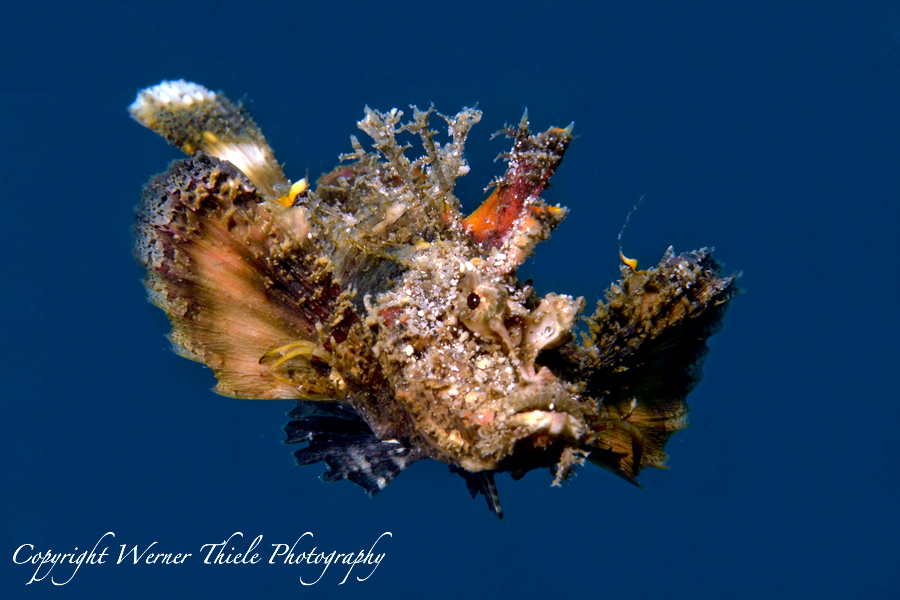Time for a bio-rant, to break up the monotony of campaign dementia. We are so sick of saturation coverage, day after day -- all this toxic rhetoric from Dems, Repubs, & the pundits who pretend to understand them. Time for a refreshing getaway -- a real vacation under the sea -- to frolic then relax amid amber waves of venom far more poisonous than even Trump can muster.
We have to groan at these "Worst This" & "Most Dangerous That" lists that flutter all over the web like stoned locusts in a hemp field, whenever social media managers run out of things to talk about. Here's the nitty gritty, folks...
A few days back, one of our esteemed colleagues in the divin' biz posted a riveting photo of one rump-ugly stonefish, with this caption -- "most venomous fish in the whole world." Immediately a buzzer went off & I could feel the bull-roar hackles rising. Say what? You sure it's the most... ?
In a sense that might be true, at least partly so. Always give it wide berth; because the stonefish can be a nasty S.O.B. But so can a sleeping hyena with an abscessed tooth -- when you shake her shoulders. Stonefish spines, when triggered, will inject a pre-synaptic nerve toxin that can halt the heart & stifle breathing. But some folks have lived for days after stepping barefoot on a stonefish; time enough for the cavalry to arrive. I've watched fishermen in Tonga scoop them off a reef with nets, carefully plop them into a bucket on board, clean them with leather gloves & exquisite TLC, then roast their muscle meat & devour it the same day!
Our SocMed friend failed to flesh out his stonefish claim with a lucid context, we feel, & therefore drifted into semi-comical hyperbole -- a quicksand pit lurking on many social media these days. ( Not all, mind you. )
I've been a PADI divemaster for 25 years, blessed to scuba- & free-dive in 3 dozen island nations around the world. Here's the gist: it's essential to massage the label of "most venomous" a fair bit to make this fully fit for any science journal, or person who prefers truth to conjecture. The qualifier "most venemous" sputters & flops in many contexts.
First off, stonefish are not only ugly as sin in a St. Louis sewer; they are among the most reclusive & elusive creatures to be found anywhere on a reef or rocky substratum undersea. Yes, they can wear camo with the best of submarine lurkers. But they're not too hard to spy. We have spotted dozens of them over the last 3 decades, at all kinds of depths; & not once has a stonefish lunged from its cubbyhole to attack, or even remotely threaten a human being.
They only project their chemical kill-shot at smaller fish when hungry, provoked or threatened. Therefore it's tough to say they're "the most venomous" anything -- when mathematical odds make it highly unlikely that any careful scuba diver or snorkeler will ever even meet one.
If this super-shy critter surges from his lair, for example, & injects spine venom directly into a nitwit human hand, or feels a nitwit human heel stepping on it during an ill-advised barefoot reef hike -- then yes that's all she wrote -- if an antivenin is not administered soon. But here's the rub: to be truly toxic, an underwater creature has to pose a reasonable likelihood that you'll even enter their "personal space."
And many species of jellyfish, one in particular, are dramatically more poisonous than a stonefish, & scores of times more likely to bump into you randomly while diving. More on that scary reality, later.
Let's digress a moment... the ubiquitous banded sea snake, with which we've dived & swum countless times over the years, all across the Pacific, has venom that can kill you in minutes; but a personality so mild 'n mellow, that we've seen beaucoup island kids in Fiji, New Caledonia, the Samoas, playing with them even on dry land, with their bare hands. If you don't squeeze these black-and-white striped snakes, or shake them suddenly, chances are high they'll never chomp you. That's not a chance I've ever been eager to take. However I've had those amiable li'l guys swim directly next to me -- even right under that most jealously guarded of "Guy Zones" -- & not once did I feel at all in danger from a reptile whose bite can kill far quicker than any cobra extant. The upshot is this: banded sea snakes are theoretically among the most venomous of maritime reptiles. Nothing more, nothing less. And that plus a couple bucks'll get you a cup o' hot coffee.
Ergo the mission-critical point is this: perhaps the most scientifically & statistically pertinent variable to be considered when ranking "the most toxic fish on planet earth" is whether or not you even stand a chance to swim within 5 meters of one. Or better yet -- whether or not the critter is aggressive by nature. NOT necessarily the ranked-on-paper molecular potency of some bad juju it packs in its poison...
For sobering example, take the diminutive & DEADLY irukandji -- perhaps the most feared critter on the Aussie Great Barrier Reef. Basically, the sting of one or two tiny irukandji jellyfish (size of a middling pea) can kill you twice as fast as anything that swims -- even the renowned blue-ringed octopus of the GBR, which lives abundantly in tide pools & coastal shallows up & down Australia's coastlines. Now many marine biologists will tell you the irukandji carries in its stingers the most potent marine toxin ever known to science. But it's not a vertebrate fish, it's a jelly. So a hair may be split here, though irukandji's have few available, as they're decidedly balder than cyanide-laced gummi bears.
Here's another fly in the ointment of maritime hyperbole: eating even a slimy slick from sushi prepped adjacent to the pierced liver of a common pufferfish ( prized by adrenally challenged Japanese gourmands ) will kill you faster than a stonefish the size of an NBA b-ball. Yet dear ol' Puffy is harmless as a puppy. I have seen divemasters gently bounce them on their palms like tennis balls in zero gravity. But the pufferfish does have a spine, ergo he IS a bona fide fishy fish. The tetrodotoxin of any adult Puff-meister seems a skosh less lethal to humans than stonefish venom, in a biochem sense, at least according to anecdotal case studies. But it will knock you down, & out, just as quick. So how will we ever really know which fish is worst, per scientific method?
Researchers are having a tough time finding volunteers for that study...
All this to conclude, fellow sunseekers, that we recommend it's best not to fling around labels like "the worst this" or "the most toxic that" without first providing a reasonable, conservative, non-hysterical context.
End of story.


 RSS Feed
RSS Feed